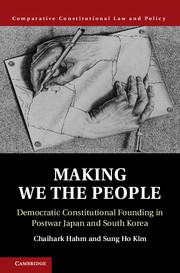
-
Select format
-
- Publisher:
- Cambridge University Press
- Publication date:
- 05 December 2015
- 10 December 2015
- ISBN:
- 9781139088480
- 9781107018822
- Dimensions:
- (228 x 152 mm)
- Weight & Pages:
- 0.61kg, 330 Pages
- Dimensions:
- Weight & Pages:
You may already have access via personal or institutional login
Book description
What does it mean to say that it is 'We the People' who 'ordain and establish' a constitution? Who are those sovereign people, and how can they do so? Interweaving history and theory, constitutional scholar Chaihark Hahm and political theorist Sung Ho Kim attempt to answer these perennial questions by revisiting the constitutional politics of postwar Japan and Korea. Together, these experiences demonstrate the infeasibility of the conventional assumption that there is a clearly bounded sovereign 'people' prior to constitution-making that stands apart from both outside influence and troubled historical legacies. The authors argue that 'We the People' only emerges through a deeply transformative politics of constitutional founding and, as such, a democratic constitution and its putative author are mutually constitutive. Highly original and genuinely multidisciplinary, this book will be of interest to democratic theorists and scholars of comparative constitutionalism as well as observers of ongoing constitutional debates in Japan and Korea.
Reviews
‘Hahm and Kim’s extraordinary intellectual achievement provides rare illumination of the crucial and deeply misunderstood concept of popular sovereignty. Their learned, elegant, and searching analysis should be an enduring part of the conversation that must be conducted if we are to make sense of our common constitutional predicament.’
Gary J. Jacobsohn - H. Malcolm Macdonald Professor of Constitutional and Comparative Law, University of Texas, Austin
‘The simultaneous writing of constitutions in twentieth-century Japan and Korea, two countries under heavy American influence, makes an obvious candidate for comparative study yet no such work has been undertaken until now. In Making We the People, Hahm and Kim have dug deeply into both histories and their global context, offering a nuanced and thoughtful account.’
Andrew Gordon - Lee and Juliet Folger Fund Professor of History, Harvard University
'Hahm and Kim persuasively argue that we can only discover who 'We the People' named in a constitution are by adopting a broader spatial and temporal lens … that considers external influences, creative uses of the past, and shifting definitions of peoplehood. Making We the People thus contributes significantly to comparative constitutional studies, East Asian studies, and scholarship on nation building and democratic theory.'
Celeste L. Arrington Source: Pacific Affairs
'Making We the People, by Chaihark Hahm and Sung Ho Kim, is an important addition to the literature on comparative constitutional law generally and on constitution-making in particular, on at least two levels. I recommend it highly in relation to both. … Making We the People is a refreshing and welcome entry into this somewhat messy field. Many of the observations that the authors make, sometimes in passing, offer insights into the enterprise of constitutional renewal that ring true and deserve emphasis.'
Cheryl Saunders Source: ICON
Contents
Metrics
Altmetric attention score
Full text views
Full text views help Loading metrics...
Loading metrics...
* Views captured on Cambridge Core between #date#. This data will be updated every 24 hours.
Usage data cannot currently be displayed.
Accessibility standard: Unknown
Why this information is here
This section outlines the accessibility features of this content - including support for screen readers, full keyboard navigation and high-contrast display options. This may not be relevant for you.
Accessibility Information
Accessibility compliance for the PDF of this book is currently unknown and may be updated in the future.


